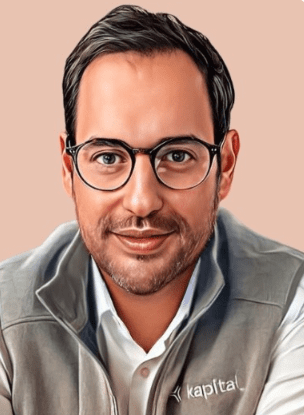Amid lower funding to startups, Mexican fintech firms still manage to land deals focusing on catering to underbanked individuals and small and medium-sized enterprises in the country.
Kapital, which offers SMEs loans and cashflow management tools, secured fresh capital last month. It raised $20 million in a Series A and $45 million in a debt facility. The fintech seeks to increase SMEs’ access to financing in Latin America and will apply the capital to product development and its expansion into Colombia.
Founders Rene Saul and Fernando Sandoval launched the startup in 2020 to create a one-stop shop for smaller enterprises to manage their cash flow, loans, and investments. The company reports 11,000 businesses as clients and expects to turn profitable later this year.
Venture capital firms Niya Partners and Tribe Capital co-led the Series A round. Accial Capital, which lends to impact-focused startups in the region, provided the lending facility. Accial has also been busy with other fintechs in the area. In the first quarter, it offered a $90 million financing line to lending unicorn Mexico and a $22 million facility to Colombia’s Avista, a fintech focused on the silver economy.
Kapital lends to SMEs in Mexico
The fintech was part of Y Combinator in 2022. That same year, it launched Kapital Flex, a tool allowing SMEs to postpone supplier payments. It also offers SME loans for up to 5 million Mexican pesos, or $300,000, and ERP software.
The company estimates that nearly half of all SMEs in Mexico do not have access to bank financing because of a lack of credit history. Moreover, a new company barely has any income to stand for, leaving little access to working capital. That is where Kapital SME loans come in, the CEO said.
More recently, the company announced an expansion into Colombia, seeking to expand its footprint across Latin America.

“Colombia is Kapital territory!” CEO Rene Saul celebrated on social media. The firm launched a virtual account that allows SMEs to access stablecoins. Despite the global selloff, the demand for such virtual currencies remains consistent in many Latin American economies where inflation is worrisomely high. ” We protect the capital of your companies with the only account in digital dollars,” the executive said.
Funding keeps flowing with Stori
To be sure, the opportunity in Mexico is not limited alone to SMEs. In one of the least banked countries in Latin America, gaps in lending to underbanked individuals are also significant.
Mexico-focused Stori recently announced a $50 million credit line extension from Community Investment Management. The unicorn markets a credit card to the underbanked, reporting two million cardholders as of this month.
“We are thrilled to have reached 2 million customers,” said Bin Chen, CEO and Co-founder of Stori. “This number carries so much weight for us because many customers have never been granted credit. (This) gives us more dry powder to deliver on our mission to democratize access to financial products and services for the underbanked population in Latin America.”
In Mexico, there were less than 30 million credit cards issued by the end of last year, according to official data from the central bank. That is roughly 20% of the country’s population, signaling a significant product access gap. Most affluent clients have more than one card, so the per-capital average tends to lower.
According to data provided by Story, barely 10.5% of Mexican adults had one by the end of 2021. “By providing credit to previously underserved populations, Stori is playing a key role in driving economic growth and prosperity in the region.”


